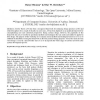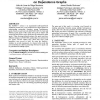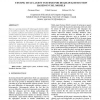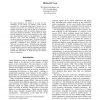916 search results - page 12 / 184 » Activity Theory for the Analysis and Design of Multi-agent S... |
INTERACT
2003
13 years 10 months ago
2003
: Activity Theory (AT) has been a recognised framework for enhancing design practices in HCI and related disciplines for a couple of decades. In most cases, AT has been deployed as...
ATAL
2005
Springer
14 years 2 months ago
2005
Springer
The PartNET++ system is an experimental multi-agent-based simulation tool that uses a new model based on hyper-graphs for understanding partnership formation among heterogeneous a...
DMS
2008
13 years 10 months ago
2008
There is a growing demand for Multi-Agent Systems (MAS) in the software industry. The autonomous agent interaction in a dynamic software environment can potentially lead to runtim...
AAAI
2000
13 years 10 months ago
2000
The paper generalizes the notion of a social law, the foundation of the theory of artificial social systems developed for coordinating Multi-Agent Systems. In an artificial social...
AAMAS
2007
Springer
14 years 3 months ago
2007
Springer
Learning Automata (LA) were recently shown to be valuable tools for designing Multi-Agent Reinforcement Learning algorithms. One of the principal contributions of LA theory is that...




